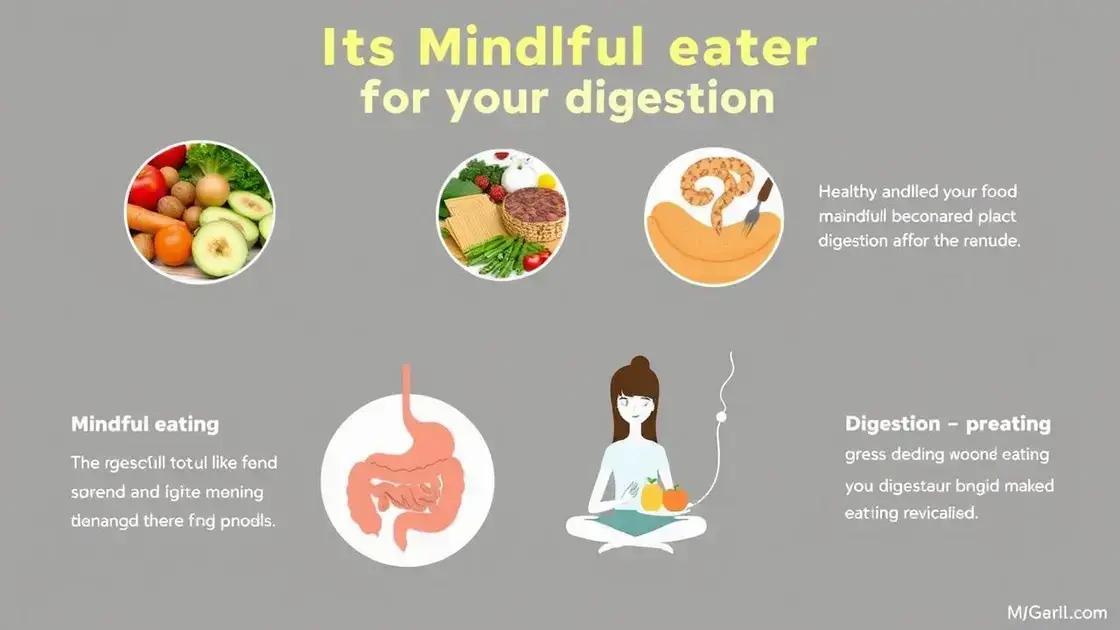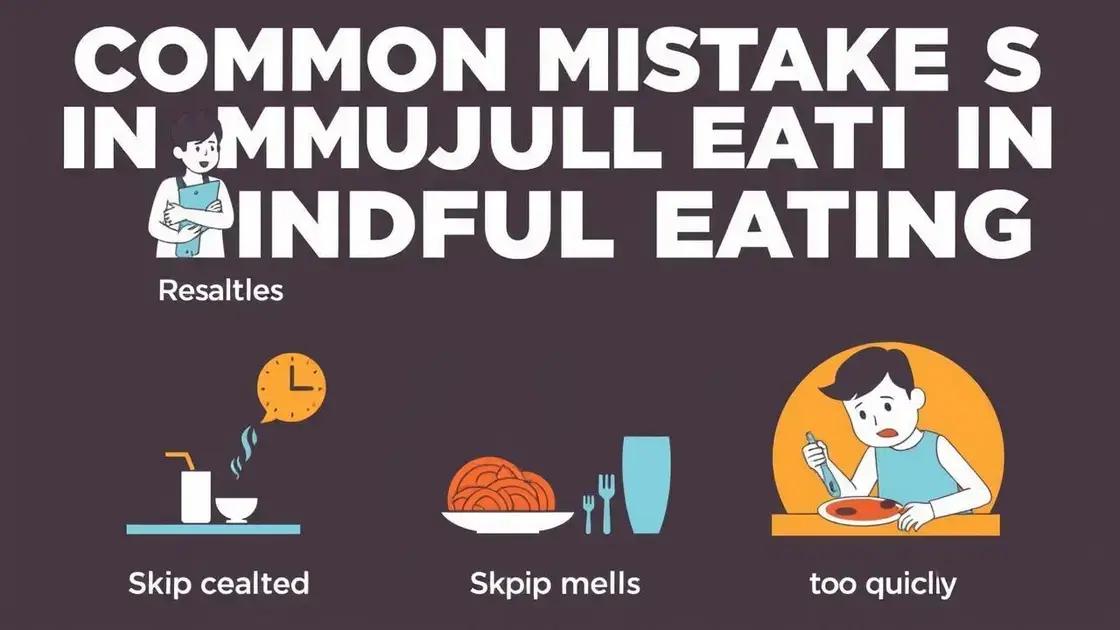Mindful eating is a practice that enhances digestion and overall well-being by encouraging awareness of the eating experience, recognizing hunger and fullness cues, and making healthier food choices. By eliminating distractions and savoring each bite, individuals can enjoy their meals more, prevent overeating, and foster a better relationship with food.
Mindful eating is an essential practice for those seeking better digestion and overall health. By focusing on the experience of eating, we can improve our digestion and enrich our relationship with food. This article explores the principles of mindful eating, its many benefits, and practical tips to integrate it into your daily routine while avoiding common pitfalls. Let’s dive deeper into how mindful eating can transform your eating habits and promote a healthier lifestyle.
Understanding Mindful Eating

Understanding mindful eating is about paying attention to the process of eating and how it makes you feel. It focuses on being present during meals, noticing tastes, textures, and scents, which can positively impact your digestion. When you practice mindful eating, you create a connection between your body and your food, making each meal a more enjoyable experience.
Mindful eating encourages you to listen to your body’s hunger and satiety signals. This means eating when you are hungry and stopping when you are full. It also helps reduce overeating as you become more aware of your body’s needs. Engaging your senses makes each meal a chance to appreciate what you are consuming, enhancing satisfaction.
Furthermore, practicing mindful eating involves eliminating distractions like phones and TVs. This helps you focus solely on your food and the eating experience. You may find that by being fully present, you enjoy your meals more and begin to notice when you are satisfied. This approach can lead to healthier food choices, as you are more attuned to your body’s responses.
Another aspect of understanding mindful eating is reflecting on where your food comes from. This awareness can lead to healthier food choices and better digestion. The more you understand about your meals, the more meaningful each bite becomes. You start to value quality over quantity, which benefits both your mind and body.
Benefits of Mindful Eating for Digestion

The benefits of mindful eating for digestion are significant and can greatly enhance your overall health. By slowing down and paying attention to what you eat, you give your body the chance to process food more effectively. This can lead to better digestion, as you take the time to chew your food properly and enjoy the flavors, which aids the digestive process.
One major benefit is reduced overeating. When you eat mindfully, you can recognize when you are full, which helps prevent discomfort from overeating. You might find that you consume smaller portions but still feel satisfied. This not only assists with digestive health but also supports a healthy weight.
Mindful eating also encourages healthier food choices. When you focus on the food, you are more likely to choose items that are nourishing and wholesome. This means adding more fruits, vegetables, and whole grains to your meals, which are essential for good digestion and overall health.
Additionally, mindful eating can reduce digestive issues such as bloating and gas. By being aware of how certain foods make you feel, you can identify triggers and make better choices that suit your body. Paying attention during meals allows you to notice how your body responds, leading to adjustments that enhance your digestive comfort.
Finally, the emotional aspect of eating should not be overlooked. Mindful eating allows you to develop a healthier relationship with food. You learn to appreciate meals without guilt or stress, which can further improve digestion by reducing stress-induced digestive problems.
Practical Tips to Start Mindful Eating

Practical tips to start mindful eating can help you create a more enjoyable and healthful eating experience. Here are some actionable strategies:
1. Start with Awareness: Begin by noticing your eating habits. Pay attention to when and what you eat. Take time to reflect on your food choices and their impact on your body.
2. Eliminate Distractions: During meals, turn off the TV and put away your phone. Focusing on your food can enhance your awareness and appreciation, making it easier to recognize hunger and fullness cues.
3. Savor Each Bite: Take the time to really taste your food. Chew slowly and enjoy the different flavors and textures. This not only improves digestion but also helps you feel more satisfied.
4. Use Smaller Plates: Serving food on smaller plates can help control portions. This simple trick can trick your mind into feeling satisfied with less food and help avoid overeating.
5. Practice Gratitude: Before eating, take a moment to appreciate your meal. Think about the effort that went into preparing it and the nourishment it provides. This can enhance your connection to food and aid digestion.
6. Set Regular Meal Times: Try to establish a routine with your meals. Regular eating times can help regulate hunger and make it easier to practice mindful eating consistently.
7. Reflect After Eating: After your meal, take a moment to reflect on how you feel. Notice any sensations in your body, and think about what you enjoyed about the meal. This helps you become more aware of your eating experience.
Common Mistakes in Mindful Eating

Common mistakes in mindful eating can hinder your progress and affect your digestion. Here are some pitfalls to watch out for:
1. Eating on Autopilot: Many people eat without thinking, often while watching TV or working. This can lead to mindless eating, making it hard to recognize hunger and fullness. Always avoid distractions during meals.
2. Skipping Meals: Some might think they can make up for it by eating mindfully later. However, skipping meals can lead to extreme hunger and overindulgence. Instead, try to stick to a regular eating schedule.
3. Ignoring Hunger Signals: Failing to listen to your body’s hunger cues can result in overeating or eating out of habit. Always pay attention to your body’s signals for hunger and fullness.
4. Being Too Rigid: While it’s important to have structure, being overly strict can create stress around food. Allow for flexibility in your eating habits to maintain a healthier attitude.
5. Eating Quickly: Rushing through meals prevents you from enjoying your food and can confuse your body’s signals of fullness. Aim to slow down and savor each bite, chewing thoroughly.
6. Not Reflecting After Meals: Failing to assess how you feel post-meal can limit your awareness. Take a moment to reflect on your eating experience, which can help you improve future meals.
7. Judging Your Choices: It’s easy to fall into the trap of guilt or shame about food choices. Instead, focus on understanding your relationship with food without judgment, promoting a healthier mindset.
Embrace Mindful Eating for Better Digestion
Mindful eating is a powerful approach that can significantly improve your digestion and overall well-being. By being present and aware during meals, you can develop a healthier relationship with food. Understanding the principles of mindful eating, recognizing its benefits, and actively engaging with the process are essential steps.
Implementing practical tips can enhance your experience, while avoiding common mistakes will allow you to reap the full rewards of this practice. As you incorporate mindful eating into your daily routine, you’ll likely discover a newfound appreciation for your meals, leading to better digestion and improved health outcomes.
So take a moment, reflect on your eating habits, and start your journey towards mindful eating today!
FAQ – Frequently Asked Questions about Mindful Eating
What is mindful eating?
Mindful eating involves paying full attention to the eating experience, noticing the taste, texture, and scent of food, and recognizing hunger and fullness cues.
How does mindful eating improve digestion?
By slowing down and savoring each bite, mindful eating can lead to better digestion by helping the body process food more effectively.
What are some practical tips for starting mindful eating?
Start by eliminating distractions during meals, savoring each bite, and paying attention to your body’s hunger and fullness signals.
What common mistakes should I avoid in mindful eating?
Avoid eating on autopilot, skipping meals, ignoring hunger signals, and being overly rigid about food rules.
Can mindful eating help with weight management?
Yes, mindful eating can help prevent overeating by encouraging portion control and promoting healthier food choices.
How can I stay consistent with mindful eating?
Establish a routine for meals, practice self-compassion, and reflect on each eating experience to maintain mindfulness.













